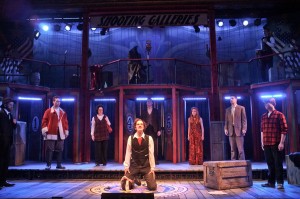From Thursday, Nov. 3 to Sunday, Nov. 6, Eastman School of Music students took the stage at Kilbourn Hall in a production of “Assassins,” presented by the Eastman Opera Theatre. This Tony-award winning musical, by Stephen Sondheim and John Weidman, tells semi-biographical stories of the nine individuals in American history who attempted to or successfully assassinated a U.S. president.
The characters, inexplicably transported into “an iconic amusement park” outside of time, are swept around in a series of intermingled sequences. Under the direction of Steven A. Daigle, the students did justice to the show by darkly portraying such infamous historical assassins as John Wilkes Booth (senior Garrett Rubin) and Lee Harvey Oswald (senior Alexander James Turpin). Meanwhile, conductor Kristin Ditlow led an ensemble of Eastman musicians through Sondheim’s moving score.
The carnival setting transformed treason into a game at a shooting gallery — the stage resembled an old-fashioned carnival, with lights and bright colors. Political themes also permeated the set, which was painted red, white and blue. The assassins frequently marched onto a large presidential seal emblazoned on the center of the stage floor, and the musical’s opening number included echoes of “Hail to the Chief.”
More so than a typical musical, “Assassins” emphasized songs over spoken dialogue. This was not a challenge for the pit orchestra, which demonstrated its prowess by consistently filling the theater with sound. Sondheim’s music artfully complemented the story, as each song reflected the era of the individual assassinations.
Each of the carnival game’s winners — who succeeded in killing a president — earned notoriety long after their death. As Booth insightfully notes, everyday people still remember Brutus even 2,000 years after he slew Caesar. Successful assassins were celebrated with flashing lights and a prize (be it a noose or an electric chair). On the other hand, those who failed were mocked.
There is truth in this assessment — average people are undoubtedly more familiar with the likes of Lee Harvey Oswald than with Samuel Byck (senior Joshua Rosenberg), who made an unsuccessful attempt against President Richard Nixon. The musical has an uncomfortable role as an extension of this legacy, further immortalizing any would-be assassin. Portrayed with artificiality reminiscent of arcade animatronics, the presidential targets fit the set’s theme well. President Ronald Reagan (sophomore Matt Moisey) mocked his potential assassin’s poor aim by popping in and out of stage doors in a life-sized version of Whack-A-Mole.
“Assassins” is a psychological play that explores the complex emotional states and motivations behind a person’s compulsion to shoot a president. This perspective is almost enough to elicit sympathy toward the assassins; however, each time the characters begin to become relatable, another episode of lunacy strikes. With his cry “Sic semper tyrannis” (thus always to tyrants), Booth may appear to have had noble justifications, but closer examination hints that it was merely a melodramatic overreaction. A similar conclusion can be made for each of the characters.
Regardless of the assassins’ motivations, they all stemmed from some variety of internal turmoil, which ranged from personal ambition to hero worship, from political ideology to certifiable madness — the private battles of these characters, however, violently breached into the public sphere. As Booth points out, assassinating a president is more than just “a tawdry little crime” like murder — it rattles the consciousness of the entire nation. In a moving scene following the assassination of JFK, a chorus of citizens sings “Some
thing Just Broke,” each recalling the instant he or she learned that the president had been shot, as video footage from the day of the real assassination was projected onto the stage floor.
After exploring the possible motivations behind assassinations, the musical concludes that any justification is ludicrous. For example, assassinating or attempting to assassinate a president because of chronic stomach pain or to impress actress Jodie Foster — as two characters do — is ridiculous.
Throughout the play, a balladeer guides and narrates the story with music. Interestingly, for this production, the same actor played the roles of the balladeer and Oswald. The audience is able to witness the character gradually evolve in the background — his outfits reflect various stages of Oswald’s life, including army fatigues representative of his tumultuous military history. With this interpretation, Oswald’s struggle over whether to shoot JFK was made particularly compelling: We see his transition from a bystander to a killer.
Turpin portrayed this inner conflict perfectly, and Oswald’s struggle became the easiest with which to sympathize. He has no pretentions of doing the right thing — he was just a man fed up with a world that refused to take notice. This message was explicitly spelled out for the audience with an unfurling sign emblazoned with the words: “Attention has been paid.”
Between these stark messages and songs like “Everyone Deserves to Be Happy,” “Assassins” provides a compelling look into the minds of historical assassins in a production well-worth watching.
Raybin is a member of the class of 2012.





